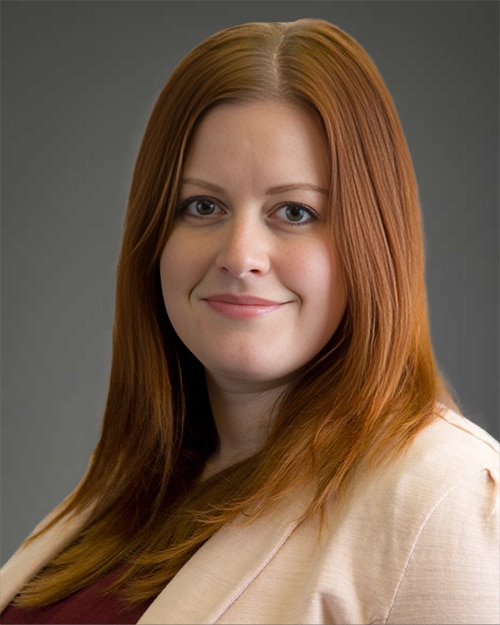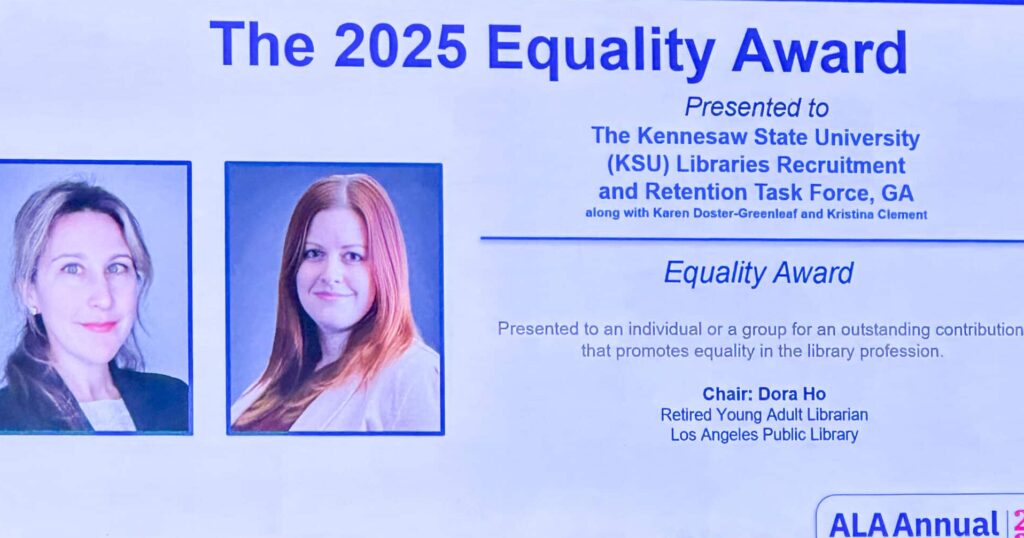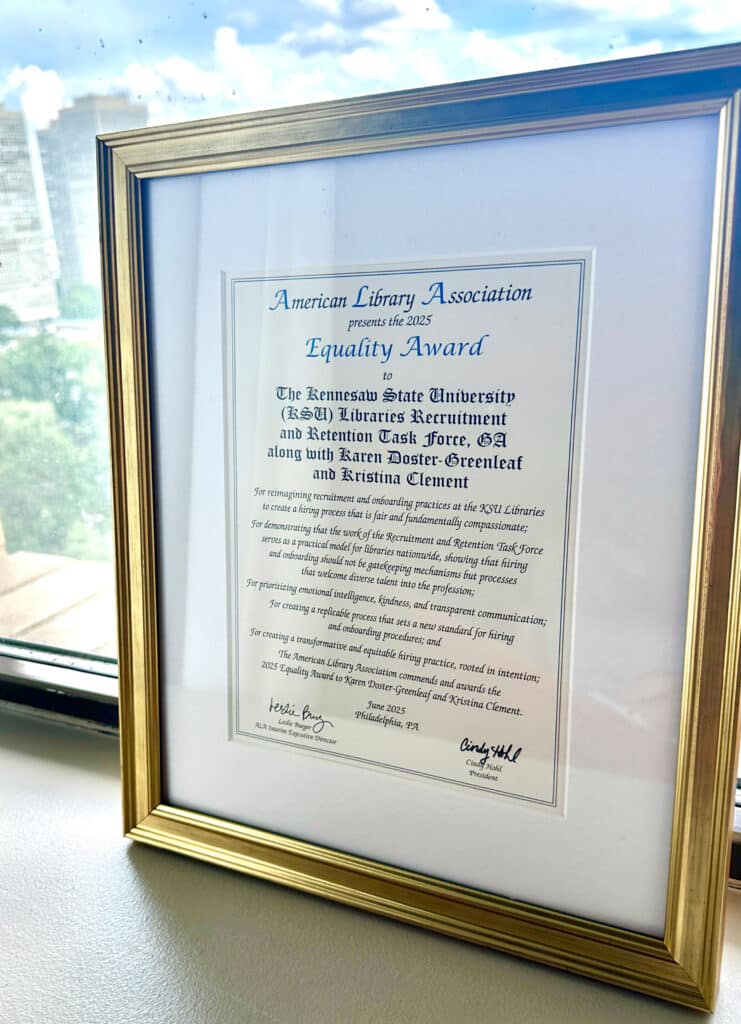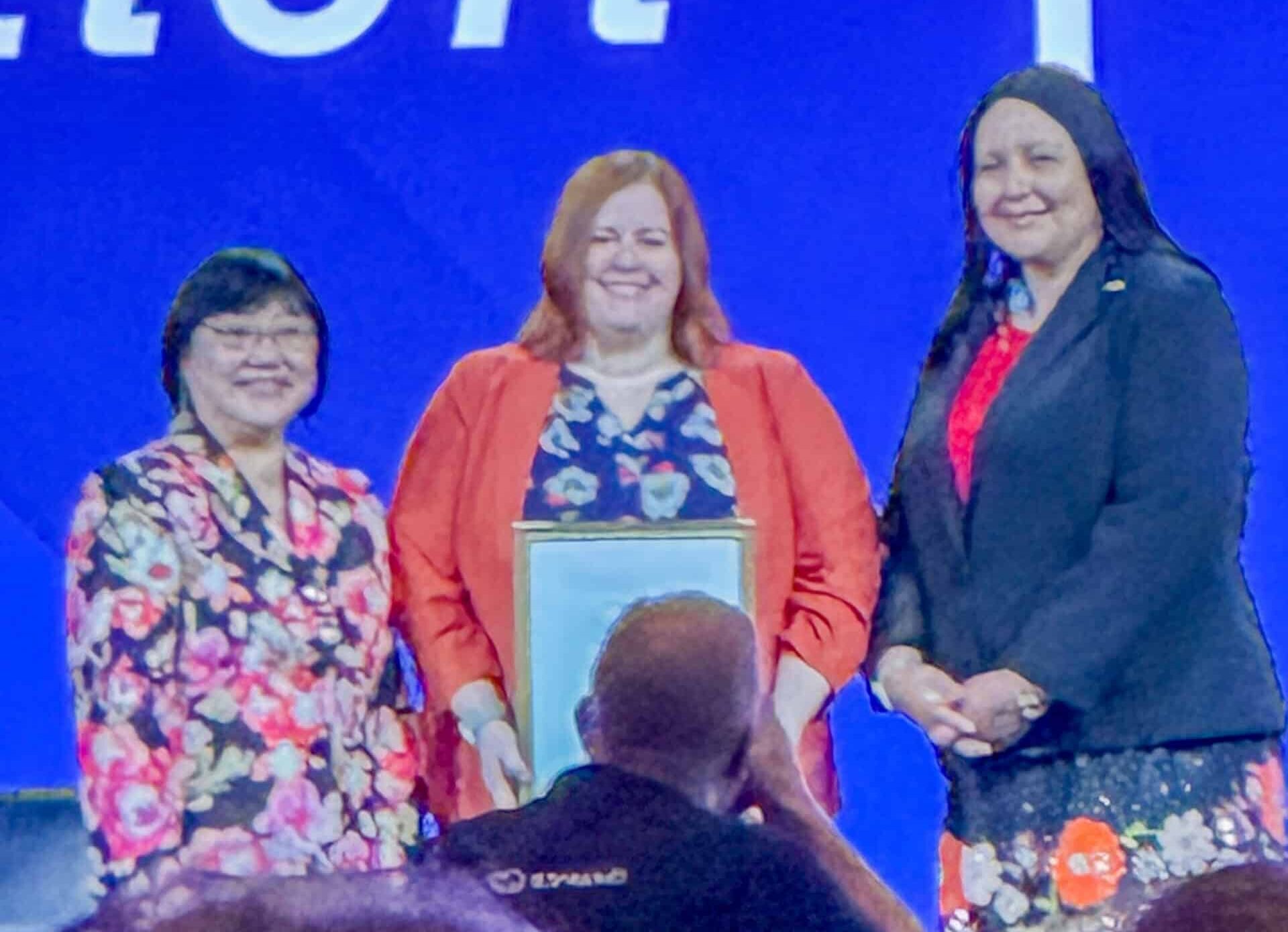When Kristina Clement (’18) took on her current role as assistant director of academic engagement and instruction for collegiate librarians at Kennesaw State University, she quickly began having informal conversations with library employees that inspired her to approach a colleague with an idea. It wasn’t long before Clement and her coworker, Karen Doster-Greenleaf, had a new project underway to improve the hiring process for the library.
That idea ultimately led to the creation of a comprehensive internal toolkit that became the cornerstone of an effort that won the duo the American Library Association’s Equality Award this year.
Clement, who is also a librarian assistant professor of library science, shared her experience submitting the application by saying, “We managed to submit it by the end-of-the-day deadline and really didn’t think much of it. Doing the application at the last minute felt a little slapdash, but I believe we managed to put together some profound content, and the work we did truly spoke for itself. About a month later, we heard that we had won, and that was pretty exciting!”
This recognition comes alongside significant internal change initiatives aimed at promoting equity in hiring and retention within KSU’s University Libraries. Clement, a proud graduate of the School of Information Sciences’ master’s program, credits her time at the University of Tennessee, Knoxville, with inspiring her vision for an inclusive workplace.

Education and Career Growth
When Clement began her undergraduate studies, she never expected to end up in librarianship.
“I went to the University of Kansas for my undergraduate degree, where I studied Italian studies. My first master’s degree was in Italian literature, which I obtained from the University of Notre Dame right after finishing my bachelor’s. Then, about six or seven years later, I decided to go to library school,” she explained.
Both of her parents are retired academic librarians who encouraged her to pursue library school.
“One day, they forwarded me a message from one of the professional listservs that said UT was recruiting students for an IMLS grant, led by Rachel Fleming-May and Dania Bilal. They were looking for 12 students to participate in the SIS program with a concentration in user experience design (UX) and assessment. I thought it sounded fun, so I decided to apply to the SIS program and the grant cohort, and I ended up moving to Knoxville in 2016,” she shared.
At the time, Clement was living in Los Angeles and working for a rare book dealer. She was excited to move across the country and start her new journey in Knoxville.
“I found it really beneficial to be part of the campus community. I got to work at Hodges Library, specifically in the outreach department, and was involved with Thura Mack. She provided me with excellent hands-on experience in an academic library, which was incredibly beneficial,” she said, referencing long-time UT Libraries librarian Mack (‘86), who earned her Master of Science in Library Science from the university.
The cohort required practicum experience, which Clement said was beneficial when she was looking for her first job.
Clement accepted a faculty position at the University of Wyoming even before graduating, which she described as a welcome relief after balancing job interviews with schoolwork and travel. There, she served as the student success librarian for nearly four years. It was a role she remembers fondly as “a really good first job to have.” With flexibility and support from her team, Clement shaped the position around her strengths and interests.
One of her major initiatives was the creation of a personal librarian program for transfer students, who made up nearly half of the university’s 10,000-12,000 students, according to Clement. Recognizing the unique challenges transfer students often face, she developed a model where librarians were assigned to students and reached out multiple times each semester to offer personalized academic support and guidance.
After several years at the UWYO, Clement began her position at KSU in March 2022. She started as the student outreach and sponsored programs librarian, focusing on events and activities that directly support student groups and student success programs. In 2023, her team undertook a comprehensive reorganization of the library.
“I eventually transitioned to our academic engagement and instruction unit, where I’m now one of two assistant directors. I supervise our collegiate librarians who serve as the primary point of contact for instruction sessions, research, engagement, and outreach. I project-manage much of their work and assist them in understanding their colleagues’ needs,” she explained.
The Work That Led to the Award
Around the same time of taking on this new role, Clement started asking colleagues throughout the library system what they thought were potential areas for improvement.
“As the new employee, I was making the rounds, getting to know people, and inviting them for coffee to chat,” she explained. “Because, back when I was an SIS student at UT, Anna Sandelli, then one of the student success librarians, once told me that the most dangerous words one librarian can say to another librarian are ‘want to get coffee?’ because it always leads to a project.”
This time, it was no different. One of those discussions was with Doster-Greenleaf, the department head of what was then the Research and Instruction Department (now Academic Engagement and Instruction). Their conversation revealed a shared vision for enhancing the hiring and onboarding process.
“We realized that we had many well-aligned ideas for how to improve our hiring practices at KSU Libraries,” Clement noted.

Together, they proposed creating a task force to reconsider the entire recruitment and retention process.
“We firmly believe that the key to onboarding and retaining employees begins with the hiring process, starting as early as crafting the job ad. The job ad is often the first impression a candidate has of your organization,” she explained.
The task force was divided into two subgroups: one focused on hiring, led by Clement, and the other on onboarding, led by Doster-Greenleaf. Their goal was to create consistency and structure where little to none had existed before.
Clement noted, “Depending on who was chairing, some committees had clear expectations and documentation, while others had almost none.”
Their final product was a comprehensive internal toolkit that became the cornerstone of their award-winning effort.
“Karen and I both really value transparency in the workplace. So our goal was to put together a toolkit that clearly outlines what it means to serve on a search committee or onboard a new hire,” Clement said.
During her time at KSU, Clement has received several awards, which gave her the confidence to apply last minute for the ALA Equality Award.
“Karen and I decided to apply for the ALA Equality Award on the application deadline. We thought we had a solid contender,” she stated, “We spent a Friday crafting our application narrative and gathering quick letters of support from our associate university librarian. I had recently chaired a search that hired two librarians and utilized the toolkit we developed from this task force. So we reached out for their feedback regarding their experiences in that hiring process.”
The Equality Award is an annual honor that consists of $1,000 and a citation of achievement. It is given to an individual or group for their outstanding contributions to promoting equality within the library profession which can be a single noteworthy accomplishment, covering areas such as pay equity, affirmative action, legislative work, and non-sexist education.

Clement and her team hope to eventually make their hiring and onboarding guide publicly available so other libraries can benefit from their work. She says the toolkit is a working document, continuously evolving to meet the needs of employees. It provides clear expectations for search committee members and practical guidance for hiring managers tasked with onboarding new colleagues.
Reflecting on UT and SIS
Her commitment to equity and transparency in hiring traces back to her time at the University of Tennessee.
“As I mentioned before, when I was at UT, I had the opportunity to work in the UT Libraries under Thura Mack, who was outstanding in mentoring me,” she said. “Whenever there was a faculty search, she took me to the public presentations that were open for everyone to attend. This experience cultivated my interest in academic library job searches, and I believe it is essential to clearly communicate expectations to candidates. I saw this emphasized during some of the searches I attended at the UT Library.”
That early exposure has shaped how she approaches every aspect of her work, from job applications to award submissions to toolkit development.
“Provide all the necessary information for reviewers to confidently recognize that the person applying deserves the award,” she stated.
As she reflects on the work that earned her and her colleagues the ALA Equality Award, Clement sees it not as a finished product but as part of a larger, ongoing effort to improve hiring, support employees, and foster a more inclusive profession. Her time at SIS laid the foundation, and today, she continues to build on it, helping shape a future in librarianship where fairness, clarity, and equity are not just ideals but expectations.

